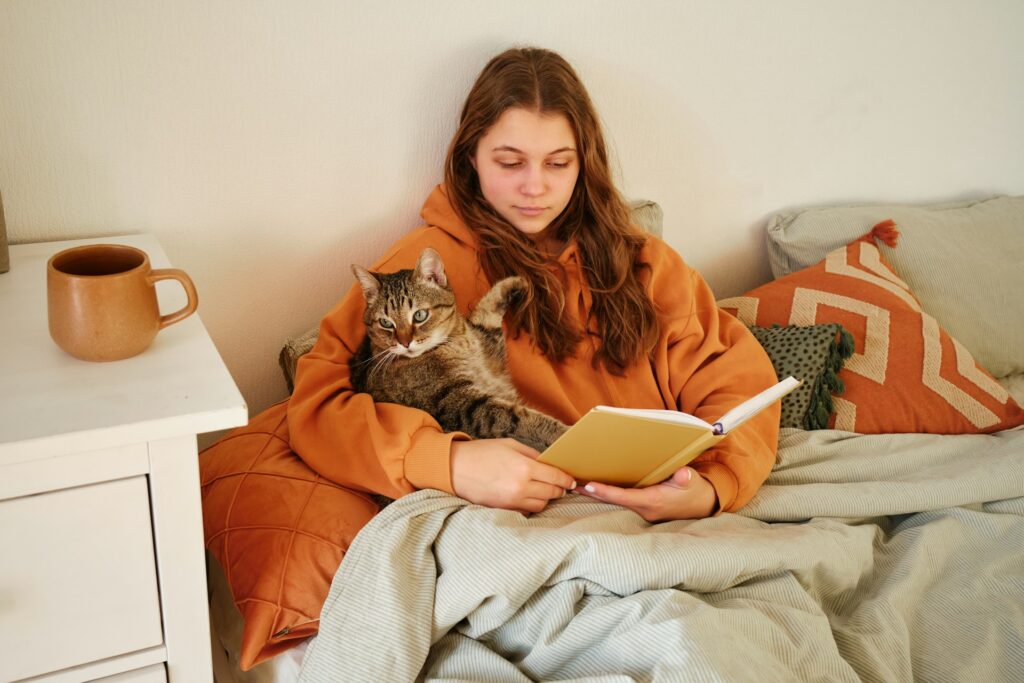We all have those days when everything feels like too much.

Maybe you’re tired, overwhelmed, or just not in the mood to keep up with the hustle and bustle of life. And while we’re often told to “stay positive” or “push through,” the reality is, it’s okay to not be okay. It’s normal to have days when you’re feeling low, stressed, or just a bit off. In fact, embracing those moments and allowing yourself to feel them can actually be good for your mental health in the long run. Here’s why it’s not only okay, but sometimes necessary, to not be okay every single day. (And if you’re truly struggling, you can reach Samaritans 24 hours a day at 116 123—don’t hesitate.)
You don’t have to be perfect.

The pressure to be perfect every day is exhausting. Whether it’s at work, in your relationships, or just in your own mind, there’s often this unrealistic expectation to be on top of everything all the time. But the truth is, nobody is perfect. It’s okay to have moments where things don’t go as planned or where you feel like you’re just not cutting it. You don’t need to be “perfect” to be worthy or to have value. Embrace the messiness of being human.
It’s part of being human.

Feeling down, tired, or out of sorts is simply part of being human. Emotions aren’t always going to be sunshine and rainbows, and that’s okay. No one is happy all the time, and no one has it all figured out. Accepting that it’s okay to feel low sometimes is an important step in embracing your humanity. It’s a reminder that it’s normal to experience ups and downs, and it’s okay to be on the down part of the rollercoaster every now and then.
You don’t have to be “on” all the time.

There’s this constant pressure to always be on—whether it’s being productive, being happy, or being social. But the truth is, you don’t have to be “on” every single day. Sometimes, you need a break, and that’s completely okay. If you need to take a step back, rest, and recharge, that doesn’t make you weak or unmotivated. It makes you human.
Life is tough, and it’s okay to acknowledge that.

Life isn’t always easy. You might be going through something difficult, or maybe things just feel a little harder than usual. It’s okay to acknowledge that life can be tough. Struggling doesn’t mean you’re failing—it just means you’re facing challenges that are part of the human experience. Acknowledging your struggles gives you the space to work through them in a healthy way instead of pushing them aside.
You don’t have to have all the answers.

Sometimes, it can feel like everyone around you has everything figured out. But the reality is, no one has all the answers. We’re all figuring it out as we go, and that’s perfectly okay. If you’re not feeling your best, and you don’t have it all figured out, that’s fine. You don’t need to have everything mapped out to be making progress. It’s okay to be uncertain or unsure, and it’s okay to take time to find your way.
It’s okay to let yourself feel emotions.

We’re often told to push past negative emotions or “snap out of it,” but that’s not always healthy. Suppressing your feelings or pretending everything is fine can lead to more stress and anxiety in the long run. Letting yourself feel your emotions—whether that’s sadness, frustration, or even anger—can help you process them and move forward in a healthier way. It’s not about wallowing; it’s about allowing yourself to feel what you need to feel.
Not every day has to be productive.

There’s this societal expectation that every day needs to be filled with productivity, whether that’s checking off items from your to-do list or accomplishing something big. But some days, you just need to exist without the pressure of doing. And that’s okay. It’s important to take time for rest and to give yourself permission to not be productive. Your worth isn’t determined by how much you accomplish every single day.
Your mental health should be a priority.

If you’re feeling off or overwhelmed, it’s a sign that your mental health needs attention. Just like you would take a sick day if you were physically ill, it’s important to give yourself the space to rest and recharge when you’re struggling mentally. Your mental health is just as important as your physical health, and sometimes the best thing you can do for your well-being is to acknowledge that you’re not feeling okay and take the time you need to heal.
You don’t have to justify your feelings.

It’s easy to feel like you need to justify your emotions to other people, especially if you don’t feel “good enough” or “grateful enough.” But you don’t have to justify your feelings to anyone. You are allowed to feel however you feel, and you don’t owe anyone an explanation for that. It’s okay to not be okay, and it’s okay to express that without having to make excuses for why you feel the way you do.
Taking time for yourself isn’t selfish.

In a world where we’re constantly told to take care of everyone else, it can feel like taking time for yourself is selfish. But that couldn’t be further from the truth. You can’t pour from an empty cup. Taking the time to focus on yourself—whether it’s resting, taking a break, or doing something that makes you happy—is a necessary part of maintaining your mental health. It’s not selfish to prioritise yourself; it’s necessary.
You can still be grateful and struggling.

Just because you’re struggling doesn’t mean you can’t still be grateful for the good things in your life. It’s possible to hold space for both of these feelings at once. You can feel grateful for the things you have, while still acknowledging that things aren’t perfect. Life isn’t an either/or situation. You don’t have to choose between gratitude and struggle—they can coexist.
No one has to see your vulnerability.

Being open about not being okay doesn’t mean you have to share every detail with everyone. You don’t have to be vulnerable in front of other people if you’re not ready to. It’s okay to take time for yourself, process what you’re going through, and decide who gets to see that side of you. Your vulnerability is yours to share when you’re ready, and you can still take care of your mental health without opening up to everyone around you.


